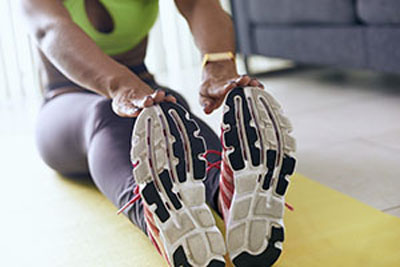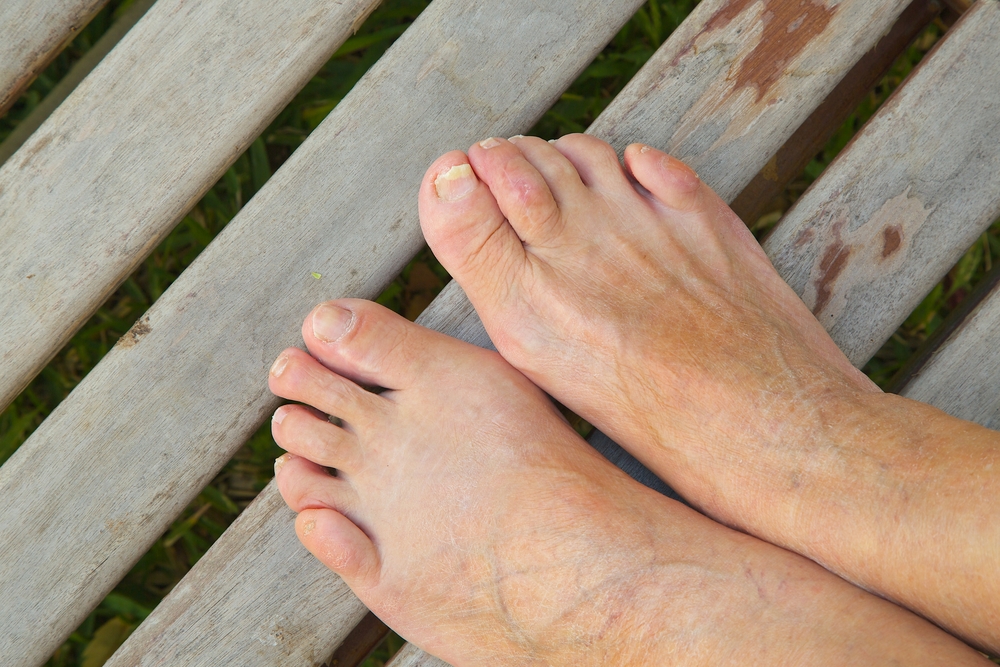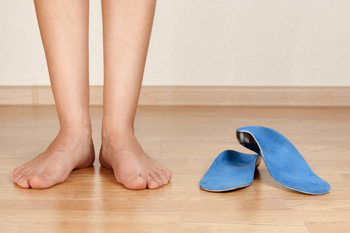Connect With Us
Blog
Items filtered by date: September 2020
Poor Circulation and the Lower Extremities
 There are a few telling signs that may indicate you are experiencing poor circulation in your lower legs and feet. Common symptoms of poor circulation may include fatigue or cramping during physical activity, cramping during inactivity, swelling and achiness, tingling, and a persistent coldness. Poor circulation can make going about your everyday activities incredibly uncomfortable and can be an indicator of more serious health concerns. A lack of feeling or numbness can also develop in your lower extremities, increasing the risk of wounds going undetected. If wounds develop on your feet and are left untreated, it’s possible they may become infected, which can lead to serious complications down the road. For professional advice on how to treat poor circulation in your lower legs and feet, please speak with a podiatrist.
There are a few telling signs that may indicate you are experiencing poor circulation in your lower legs and feet. Common symptoms of poor circulation may include fatigue or cramping during physical activity, cramping during inactivity, swelling and achiness, tingling, and a persistent coldness. Poor circulation can make going about your everyday activities incredibly uncomfortable and can be an indicator of more serious health concerns. A lack of feeling or numbness can also develop in your lower extremities, increasing the risk of wounds going undetected. If wounds develop on your feet and are left untreated, it’s possible they may become infected, which can lead to serious complications down the road. For professional advice on how to treat poor circulation in your lower legs and feet, please speak with a podiatrist.
While poor circulation itself isn’t a condition; it is a symptom of another underlying health condition you may have. If you have any concerns with poor circulation in your feet contact Dr. James D. McAlexander of Gig Harbor Foot and Ankle Clinic. Our doctor will treat your foot and ankle needs.
Poor Circulation in the Feet
Peripheral artery disease (PAD) can potentially lead to poor circulation in the lower extremities. PAD is a condition that causes the blood vessels and arteries to narrow. In a linked condition called atherosclerosis, the arteries stiffen up due to a buildup of plaque in the arteries and blood vessels. These two conditions can cause a decrease in the amount of blood that flows to your extremities, therefore resulting in pain.
Symptoms
Some of the most common symptoms of poor circulation are:
- Numbness
- Tingling
- Throbbing or stinging pain in limbs
- Pain
- Muscle Cramps
Treatment for poor circulation often depends on the underlying condition that causes it. Methods for treatment may include insulin for diabetes, special exercise programs, surgery for varicose veins, or compression socks for swollen legs.
As always, see a podiatrist as he or she will assist in finding a regimen that suits you. A podiatrist can also prescribe you any needed medication.
If you have any questions, please feel free to contact our office located in Gig Harbor, WA . We offer the newest diagnostic and treatment technologies for all your foot care needs.
Can Orthotic Insoles Help My Flat Feet?
Flat feet is a condition that causes the middle of the feet to be flat rather than arched. While some people with flat feet may have no issues, others can feel pain and discomfort that interferes with their daily lives and activities. Orthotic insoles are special shoe inserts that can help with various foot problems, including flat feet. If you have pain or discomfort caused by flat feet, wearing orthotic insoles in your shoes can provide extra cushioning and relief. There are a variety of different orthotics, and the type of orthotics that are best for you will depend on the specific structure of your foot and your daily lifestyle needs. For more information about how orthotic insoles may help with your flat feet, speak with a podiatrist today.
If you are having discomfort in your feet and would like to try orthotics, contact Dr. James D. McAlexander from Gig Harbor Foot and Ankle Clinic. Our doctor can provide the care you need to keep you pain-free and on your feet.
What Are Orthotics?
Orthotics are inserts you can place into your shoes to help with a variety of foot problems such as flat feet or foot pain. Orthotics provide relief and comfort for minor foot and heel pain but can’t correct serious biomechanical problems in your feet.
Over-the-Counter Inserts
Orthotics come in a wide variety of over-the-counter inserts that are used to treat foot pain, heel pain, and minor problems. For example, arch supports can be inserted into your shoes to help correct overarched or flat feet, while gel insoles are often used because they provide comfort and relief from foot and heel pain by alleviating pressure.
Prescription Orthotics
If over-the-counter inserts don’t work for you or if you have a more severe foot concern, it is possible to have your podiatrist prescribe custom orthotics. These high-quality inserts are designed to treat problems such as abnormal motion, plantar fasciitis, and severe forms of heel pain. They can even be used to help patients suffering from diabetes by treating foot ulcers and painful calluses and are usually molded to your feet individually, which allows them to provide full support and comfort.
If you are experiencing minor to severe foot or heel pain, it’s recommended to speak with your podiatrist about the possibilities of using orthotics. A podiatrist can determine which type of orthotic is right for you and allow you to take the first steps towards being pain-free.
If you have any questions please contact our office located in Gig Harbor, WA . We offer the newest diagnostic and treatment technologies for all your foot and ankle needs.
Causes of Cracked Heels
 Cracked heels occur when the skin on the heels becomes thickened and dried out. Because the soles of the feet lack oil glands, the feet’s skin is often drier than the skin on the rest of the body. Due to this lack of moisture, the skin may lose its elasticity and become painful and unsightly. There are a variety of issues that can cause heels to dry out. Pressure on the feet from too much standing or weight gain can increase the risks of cracks. Footwear that offers little protection of the heel, such as flip flops, can also cause the skin in the heels to dry out. Conditions such as fungal infections, lack of nutrients in the skin and genetics are also risk factors for cracked heels. If you are suffering from cracked heels, it is important to consult with a podiatrist for proper treatment and relief methods.
Cracked heels occur when the skin on the heels becomes thickened and dried out. Because the soles of the feet lack oil glands, the feet’s skin is often drier than the skin on the rest of the body. Due to this lack of moisture, the skin may lose its elasticity and become painful and unsightly. There are a variety of issues that can cause heels to dry out. Pressure on the feet from too much standing or weight gain can increase the risks of cracks. Footwear that offers little protection of the heel, such as flip flops, can also cause the skin in the heels to dry out. Conditions such as fungal infections, lack of nutrients in the skin and genetics are also risk factors for cracked heels. If you are suffering from cracked heels, it is important to consult with a podiatrist for proper treatment and relief methods.
If the skin on your feet starts to crack, you may want to see a podiatrist to find treatment. If you have any concerns, contact Dr. James D. McAlexander from Gig Harbor Foot and Ankle Clinic. Our doctor can provide the care you need to keep you pain-free and on your feet.
Cracked Heels
It is important to moisturize your cracked heels in order to prevent pain, bleeding, and infection. The reason cracked heels form is because the skin on the foot is too dry to support the immense pressure placed on them. When the foot expands, the dry skin on the foot begins to split.
Ways to Help Heal Them
- Invest in a good foot cream
- Try Using Petroleum Jelly
- Ease up on Soaps
- Drink Plenty of Water
Ways to Prevent Cracked Heels
- Moisturize After Showering
- Skip a Shower
- Keep Shower Water Lukewarm
- Don’t Scrub Your Feet
If you are unsure how to proceed in treating cracked heels, seek guidance from a podiatrist. Your doctor will help you with any questions or information you may need.
If you have any questions, please feel free to contact our office located in Gig Harbor, WA . We offer the newest diagnostic and treatment technologies for all your foot care needs.
Do I Need Hammertoe Surgery?
 A hammertoe, as its name suggests, is a condition that affects the joints of the toe, causing it to bend in a downward shape, resembling a hammer. To help improve the toe’s flexibility, lessen the pain caused by the hammertoe, and to straighten the affected toe, surgery may be a good option for you. Surgery for a hammertoe will typically be suggested by a professional after conservative treatments, such as splints or orthotics, have failed to improve the condition. To help prepare for surgery, your podiatrist may suggest seeing a physical therapist, keeping weight off of your toe, and practicing certain exercises to help improve your overall balance in order to prepare you for moving around post-surgery. To help decide if surgery is the best treatment option for you, please consult with a podiatrist.
A hammertoe, as its name suggests, is a condition that affects the joints of the toe, causing it to bend in a downward shape, resembling a hammer. To help improve the toe’s flexibility, lessen the pain caused by the hammertoe, and to straighten the affected toe, surgery may be a good option for you. Surgery for a hammertoe will typically be suggested by a professional after conservative treatments, such as splints or orthotics, have failed to improve the condition. To help prepare for surgery, your podiatrist may suggest seeing a physical therapist, keeping weight off of your toe, and practicing certain exercises to help improve your overall balance in order to prepare you for moving around post-surgery. To help decide if surgery is the best treatment option for you, please consult with a podiatrist.
Hammertoe
Hammertoes can be a painful condition to live with. For more information, contact Dr. James D. McAlexander from Gig Harbor Foot and Ankle Clinic. Our doctor will answer any of your foot- and ankle-related questions.
Hammertoe is a foot deformity that affects the joints of the second, third, fourth, or fifth toes of your feet. It is a painful foot condition in which these toes curl and arch up, which can often lead to pain when wearing footwear.
Symptoms
- Pain in the affected toes
- Development of corns or calluses due to friction
- Inflammation
- Redness
- Contracture of the toes
Causes
Genetics – People who are genetically predisposed to hammertoe are often more susceptible
Arthritis – Because arthritis affects the joints in your toes, further deformities stemming from arthritis can occur
Trauma – Direct trauma to the toes could potentially lead to hammertoe
Ill-fitting shoes – Undue pressure on the front of the toes from ill-fitting shoes can potentially lead to the development of hammertoe
Treatment
Orthotics – Custom made inserts can be used to help relieve pressure placed on the toes and therefore relieve some of the pain associated with it
Medications – Oral medications such as anti-inflammatories or NSAIDs could be used to treat the pain and inflammation hammertoes causes. Injections of corticosteroids are also sometimes used
Surgery – In more severe cases where the hammertoes have become more rigid, foot surgery is a potential option
If you have any questions please contact our office located in Gig Harbor, WA . We offer the newest diagnostic and treatment technologies for all your foot and ankle needs.
Blog Archives
- March 2025
- February 2025
- January 2025
- December 2024
- November 2024
- October 2024
- September 2024
- April 2023
- March 2023
- February 2023
- January 2023
- December 2022
- November 2022
- October 2022
- September 2022
- August 2022
- July 2022
- June 2022
- May 2022
- April 2022
- March 2022
- February 2022
- January 2022
- December 2021
- November 2021
- October 2021
- September 2021
- August 2021
- July 2021
- June 2021
- May 2021
- April 2021
- March 2021
- February 2021
- January 2021
- December 2020
- November 2020
- October 2020
- September 2020
- August 2020
- July 2020
- June 2020
- May 2020
- April 2020
- March 2020
- February 2020
- January 2020
- December 2019
- November 2019
- October 2019
- September 2019
- August 2019
- July 2019
- June 2019
- May 2019
- April 2019
- March 2019
- February 2019
- January 2019
- December 2018
- November 2018
- October 2018
- September 2018
- August 2018
- July 2018
- June 2018
- May 2018
- April 2018
- March 2018
- February 2018
- January 2018
- December 2017
- November 2017
- October 2017


